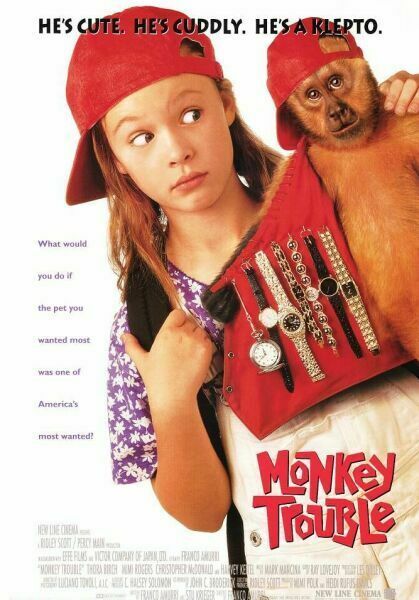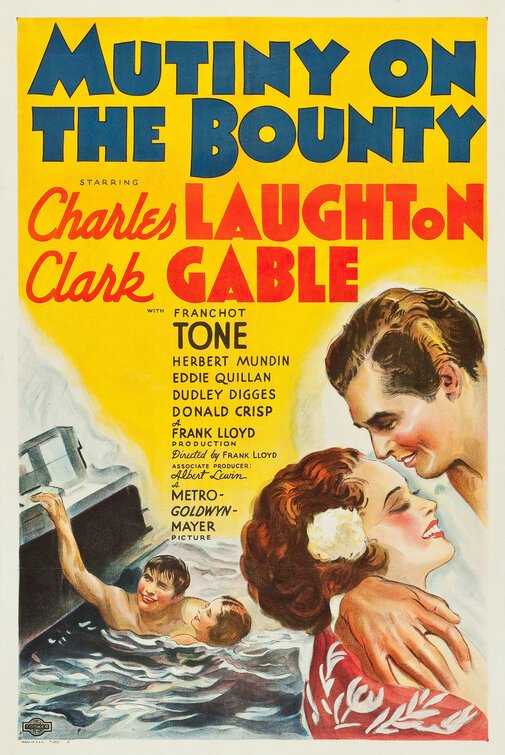“Amazing Cinematic Achievement”
What You Need To Know:
MUTINY ON THE BOUNTY stars Clark Gable and Charles Laughton in a 1935 movie based on the famous 1789 mutiny against a cruel captain in the British Navy. The Bounty sets sail for Tahiti to bring back some breadfruit plants to grow in the West Indies. During the voyage, the men chafe under the cruel treatment of Captain Bligh. They’d rather stay in the island paradise of Tahiti. However, on the way back to England, Bligh’s cruelty becomes unbearable, and the sailors mutiny.
MUTINY ON THE BOUNTY is an amazing achievement for 1935. The sets, cinematography, costumes, and acting are brilliant. The movie conveys positive messages about showing kindness, standing up to oppression and cruelty, and valuing family, with a few positive Christian references. Despite this positive content, MUTINY ON THE BOUNTY contains violence and depictions of cruelty. The movie also contains some false revisionist history that makes Captain Bligh appear worse than he probably was in real life. Because of the violence, cruelty and revisionist history, MOVIEGUIDE® advises caution for older children for the 1935 version of MUTINY ON THE BOUNTY.
Content:
Light moral world worldview mixed with some Christian elements like a prayer and a Christmas song, but mostly the movie is a patriotic worldview encouraging people to stand up to tyranny and fight back, but there is some revisionist history in the movie making a mean captain look as bad as possible (for example, the movie shows the captain keelhauling a sailor, which is dragging a sailor underwater under a ship along the keel, but the practice was long abandoned by the time of the mutiny depicted in the movie and, in actuality, the flogging rate experienced on the real ship was lower than average for that time in the British Navy)
No foul language
Quite a lot of violence here as a captain abuses his crewmembers and the crewmen start an uprising, many whippings are either talked about or shown directly, men fight, men are shoved around, and men are hung, put in irons and starved,
Some implied and suggested sexuality as two women dance suggestively and a man grabs one of them and kisses her, a man looks at women and says, “My what a place,” and sailors seem to be enjoying the company of native women on the island of Tahiti in the late 18th Century
Upper male nudity and women appear to be topless with long hair covering their breasts
One old man is an alcoholic, and he is shown drinking on several occasions, his alcoholism is also talked about
No smoking or drug use; and,
A cruel captain accuses his shipmen of lying and often punishes them simply because he feels like hurting them.
More Detail:
In 1932, a popular book by the same name was published about the mutiny’s historical events. The story is about a cruel captain on a ship, William Bligh (played by Charles Laughton), who punishes his crew, not merely to discipline them, but because he enjoys seeing them suffer. Bligh’s lieutenant, Fletcher Christian (played by Clark Gable), is at first obedient to Bligh’s commands, but as the voyage continues he decides to stand up to Bligh’s tyranny. Christian, unlike Bligh, has a very kind and compassionate heart and doesn’t like to see men hurting, let alone enact their punishments.
Much of the movie is about the conflict between Bligh and Christian. In the beginning, Bligh favors Christian because he’s very compliant, until Christian starts to challenge him. It all starts when Bligh accuses his men of stealing cheese when he himself has really taken it. At dinner Bligh offers Christian and a few other officers some of the cheese, but when they refuse, Bligh gets upset. Christian hates the way Bligh is torturing his crew members, but he bites his tongue until he finally breaks.
The ship visits the island of Tahiti to pick up some breadfruit plants to grow in the West Indies in the Caribbean. The men are enamored with the easygoing life of the natives on Tahiti, which includes beautiful native girls. Their discipline grows lax.
So, when Captain Bligh orders the ship to begin its return voyage, the men aren’t happy about it. On the journey home, Bligh starts rationing the water supplies to make sure the breadfruit plants have enough water. The last straw happens when Bligh imprisons a couple sailors and the jailors abuse them and won’t give them any water.
After this, Fletcher Christian decides to start a mutiny and send Captain Bligh, along with his loyalists, out to sea in a small boat. It should be noted that Christian doesn’t condone violence. He stops the other mutineers from flogging and killing their captain because he hates bloodshed.
Bligh takes charge on the lifeboat to make sure the men can survive the thousand-mile voyage to civilization. Meanwhile, Fletcher orders the Bounty back to Tahiti, where he and the men enjoy a couple years of peace and freedom, until another British ship is spotted on the horizon.
Although Fletcher is viewed as the hero in the movie because he finally had the courage to stand up to his captain, some of his character traits are not admirable. Christian puts his friend, Midshipman Roger Byam (played by Franchot Tone) in a very bad position when he forces Roger him to stay on board the Bounty and doesn’t let him go with Bligh. This makes Roger appear to be part of the mutiny. Christian also deserts Roger and disappears when Bligh comes to look for the crew. It’s safe to say that Christian isn’t a very loyal friend. Christian is compassionate and brave, but his decision to start a revolt against his captain might encourage people to rebel against all authority figures with whom they disagree.
MUTINY ON THE BOUNTY is an amazing achievement for 1935. The sets, cinematography, costumes, and acting are brilliant. In addition, the movie conveys positive messages about showing kindness, standing up to oppression and cruelty, and valuing family. The movie also contains a few Christian references, but it’s mostly about fighting for freedom and dignity. Despite this positive content, MUTINY ON THE BOUNTY contains violence and depictions of cruelty. The movie also contains some false revisionist history. For example, in one scene, Captain Bligh orders a sailor to be “keelhauled,” a practice whereby a sailor is dragged underwater under the ship from bow to stern or from one side to the other. This punishment had long been abandoned prior to Bligh’s time and never happened on the Bounty. Also, the flogging rate aboard the Bounty under Bligh was actually lower than average. Thus, the movie makes Captain Bligh appear worse than he probably was in real life.
Because of the violence, cruelty and revisionist history, MOVIEGUIDE® advises caution for older children for the 1935 version of MUTINY ON THE BOUNTY. The movie was remade by Marlon Brando in 1962 and by Mel Gibson in 1984.



 - Content:
- Content: 

